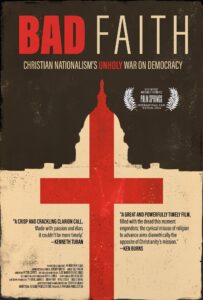Movie Review: New Documentary, Bad Faith, Shines a Sobering Light on the Foundations, Dangers of Christian Nationalism

Bad Faith: Christian Nationalism’s Unholy War on Democracy makes no mistake about its intentions, opening with its own definition of Christian nationalism right at the top.
“A political movement that believes America was founded as a ‘Christian Nation,’ privileging Christianity over all other faiths. Masquerading as religion, this ideology exploits scripture and sacred symbols to achieve extremist objectives.”
This roughly 90-minute documentary released April 26 to streaming platforms Apple TV+, Amazon Prime, and Google Play. And within the first few seconds of the film, it quickly delivers on what it promises in the title.
The opening sequence shows scenes from the Jan. 6, 2021 rally and subsequent insurrection at the U.S. Capitol, providing a simple yet sobering premise. Why does Christian nationalism seem more prominent than ever, and how did we get to this point where it has taken up so much space politically?
Bad Faith does an excellent job of providing viewers with a historical throughline of Christian nationalism as we know it today, starting with its roots in the early 20th century as a coordinated means to maintain racial segregation, to its current form as a way to dismantle church-state separation and exert minority rule in the U.S. government.
The film heavily features Paul Weyrich, who co-founded or was a founding member of a cadre of conservative organizations, including The Heritage Foundation, the Free Congress Foundation, Moral Majority, American Legislative Exchange Council, and the Council for National Policy. Weyrich is credited with being the architect behind the modern Christian nationalism movement, and his decades of work are seen as the blueprint for The Heritage Foundation’s Project 2025.
Throughout the film, we’re repeatedly shown passages from “Integration of Theory and Practice,” a manual that Weyrich helped to craft at the Free Congress Foundation. It’s a chilling, albeit effective, device that the filmmakers use to underscore the tone of Bad Faith, and the intentions behind the modern Christian nationalism movement.
The passage reads: “Our movement will be entirely destructive, and entirely constructive. We will not try to reform the existing institutions. We only intend to weaken them, and eventually destroy them.”
It’s a point that is re-emphasized several times in the film, as you’re provided with an inside look into the “machinery” of the Christian nationalism movement and everything that has been invested into its sustainability over the years.
Against all of this historical information are the de facto talking heads one would expect in a documentary to help guide the viewer along and provide context. We meet with religious leaders who are against Christian nationalism, former government leaders, authors, experts, and sometimes pastors who are very keen on installing Christian nationalism as a legitimate form of government.
The filmmakers’ intention with Bad Faith appears two-fold: Educate its audience about the history and dangers of Christian nationalism, as well as encourage folks to register to vote.
In total, the documentary is simultaneously informative, sobering, chilling, frightening, but always with vestiges of hope. It does an excellent job of showing the viewer what’s at stake for democracy, what’s already been lost to the rise of Christian nationalism, and what the future could hold if Christian nationalism continues to gain ground.
Above all of that, however, it is a reminder for viewers that although Christian nationalism has made some strides in this country, it cannot triumph if we all exercise our civic duty to vote.
